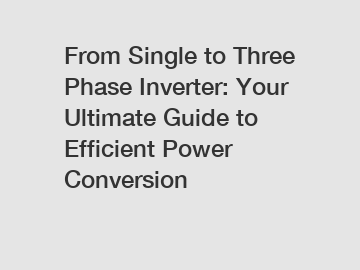From Single to Three Phase Inverter: Your Ultimate Guide to Efficient Power Conversion
From Single to Three Phase Inverter: Your Ultimate Guide to Efficient Power Conversion.
In the world of power electronics, inverters play a crucial role in converting DC power to AC power. They are widely used in various applications such as renewable energy systems, motor drives, and grid-tied inverters. Initially, single-phase inverters were the most common choice for many applications due to their simplicity and cost-effectiveness. However, as energy demands increased and three-phase power systems became prevalent, the need for efficient power conversion led to the development of three-phase inverters.
The transition from single-phase to three-phase inverters was driven by several factors. Firstly, three-phase power systems provide several advantages over single-phase systems. They deliver a more balanced power distribution, resulting in lower voltage drop and improved power quality. Additionally, three-phase motors are more efficient, reliable, and produce smoother torque compared to their single-phase counterparts.

The increased adoption of renewable energy sources, such as solar and wind, played a significant role in the shift towards three-phase inverters. The higher power output of renewable energy systems required the use of three-phase inverters to efficiently convert the generated DC power into AC power for grid integration. Moreover, three-phase inverters enable better synchronization with the grid, allowing for seamless power flow and reducing the risk of grid instability.
The development of advanced control algorithms and improved semiconductor technology also contributed to the rise of three-phase inverters. With the ability to handle higher power levels and deliver improved efficiency, three-phase inverters have become the preferred choice for high-power applications. Furthermore, advancements in semiconductor devices, such as silicon carbide (SiC) and gallium nitride (GaN), have led to higher switching frequencies and reduced power losses in three-phase inverters.
The transition from single-phase to three-phase inverters has significant implications for various industries. The increased efficiency and power conversion capabilities of three-phase inverters have resulted in reduced energy consumption and lower operating costs. This is particularly beneficial in industrial applications, where a large amount of power is required. Additionally, the improved power quality offered by three-phase inverters enhances the performance and reliability of sensitive equipment, such as motor drives and appliances.
In conclusion, the shift from single-phase to three-phase inverters has revolutionized the field of power conversion. The advantages of three-phase power systems, coupled with advancements in control algorithms and semiconductor technology, have paved the way for efficient and reliable power conversion. The adoption of three-phase inverters has not only improved energy efficiency but also enhanced the performance and reliability of various applications. As we continue to rely on power electronics for our energy needs, understanding the transition from single to three-phase inverters is essential for efficient and sustainable power conversion.
Contact us to discuss your requirements of solar three phase inverter, three phase inverters, commercial power inverter. Our experienced sales team can help you identify the options that best suit your needs.


